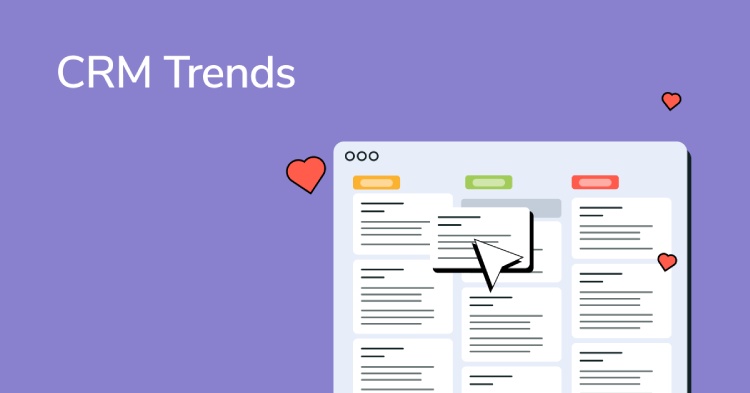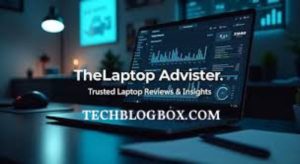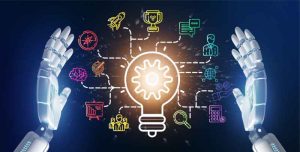CRM Trends You Need to Know in 2023

CRM Trends You Need to Know in 2023
CRM trends are essential for organizations to be aware of if they want to keep on top of the customer relationship management (CRM) market’s rapid expansion in the upcoming years.
Business owners need to pay special attention to the following CRM developments that are most anticipated for 2023 and beyond:
Table of Contents
1. Automation:
Business operations increasingly rely on automation, which is anticipated to last through 2023. To help reduce manual labor and streamline processes, businesses could investigate automation technologies such as Chatbots or automated customer care systems.
Automating repetitive operations frees up essential resources for new creative endeavors. Businesses can also provide better client experiences by giving customers faster and better service with automation solutions. Also, it enables business owners to scale their operations swiftly.
2. Data-Driven Insights:
Understanding current trends, projecting customers’ future demands, and creating more effective services depends increasingly on the ability to analyze enormous volumes of raw data from customers’ interactions with a firm. A CRM system with a 360-degree perspective of the consumer can provide data-driven insights to discover client preferences and support the customization of marketing efforts.
Analytics technologies can also be used to gauge the effectiveness of marketing campaigns, which might encourage companies to change their strategy. Investing in analytical tools will provide your company with a competitive edge over other companies.
3. Connected Devices or IoT:
The “Internet of Things” trend has enabled gadgets like phones, tablets, TVs, wearables, home appliances, and even cars to link online. It allows companies to exhibit cross-channel operations by giving customers a smooth experience across all attached devices. In 2023, this will become a more typical occurrence as IoT technology continues to advance quickly.
4. Artificial Intelligence (AI) & Machine Learning:
In 2023, AI will continue to be implemented into more elements of contemporary life, particularly in customer relationship management (CRM).
Businesses may create focused plans based on real-time analysis rather than guesswork or intuition alone, thanks to AI tools’ ability to deliver pertinent insights about customers’ behavior patterns that would otherwise be challenging or impossible for people to understand alone.
Moreover, machine learning algorithms are increasingly utilized in marketing automation projects to help optimize campaigns by automatically tailoring messages based on user profiles or previous behavior.
5. CRM for Lead and Task Management:
A CRM system’s key advantage is its capacity to efficiently manage leads across all sales process phases until they become paying customers.
CRM technology does provide an easier way for businesses to track leads throughout their lifecycle—from identification through nurturing and up until conversion—in one central system as opposed to having information dispersed across multiple departments within a business, where it becomes challenging, if not impossible, to access information when needed urgently.
CRM systems also provide several features designed specifically for managing leads that are geared for prospects based on their interests, assisting teams in fast adjusting strategies accordingly to accomplish desired outcomes and optimize results in the long run. In 2023, as CRM technology develops further, expect to see a move away from simple lead capture tracking as CRM software accurately predicts leads’ future behavior based on their historical and current behavior using machine learning algorithms and predictive analytics.
Businesses can quickly create tasks, assign them to teams, establish due dates and reminders, and track progress with the correct CRM for Task Management solutions in place. A comprehensive CRM system for task management ensures that work is completed on time and frees firms to concentrate on expanding their operations rather than handling daily duties. It’s easy to increase productivity and maintain organization while planning for the future.
6. CRM for Education Consultants:
As they can manage client connections and keep track of student profiles, inquiries, goals, and follow-ups on a single platform. CRM solutions have become popular among education consultants. This makes the job lot more straightforward in terms of remaining organized.
Additionally, Edu-consultants use CRM systems’ wide range of capabilities, including auto-reminders, booking confirmations, student counseling sessions, and team cooperation reports. To create detailed summaries of how customers advance efficiently.
You may anticipate seeing more sophisticated capabilities introduced to software features like audio analysis. And different language processing as CRM technology progresses to help provide better insights of delighted customers. Due to the nature of the business, education consultancies may need specific CRM software. Still, even in that case, these resources continue to be vital assets that help them manage daily tasks effectively.
7. CRM for Immigration Business:
To ensure that everything proceeds quickly and efficiently without any hiccups or unneeded issues. Managing immigration cases calls for highly planned workflow patterns.
Although some immigration firms may still use old-fashioned techniques to address this issue. Such as paper filing, physical folders, and traditional databases, more forward-thinking ones. Now use CRM solutions to achieve better results and faster turnaround times because of the various tracking features provided within those platforms.
With just a few clicks, immigration businesses can accurately and dependably store and manage various applications and documents for potential clients using CRM software. In addition, additional advantages like automated tasks, notifications, and paperless filing options are available at every stage.
Conclusion:
CRM is a crucial tool for running your company efficiently. And keeping up with the latest trends will help you make the required adjustments. As technology advances further with the introduction of AI, CRM trends will continue to change. Still, adapting to the new wave of development is crucial to stay competitive. And to benefit your organization in the long term.
With the epidemic and technological advancement in recent years, company strategy has undergone a significant shift. Traditional approaches will not work or be dependable in the modern world.
Explore our SaaS products for a bit; they are designed to assist immigration agents in managing their businesses more effectively.
Also read: Benefits Of Enterprise Quality Control Inspection Software
Also read: All You Need To Know About Data Quality?




